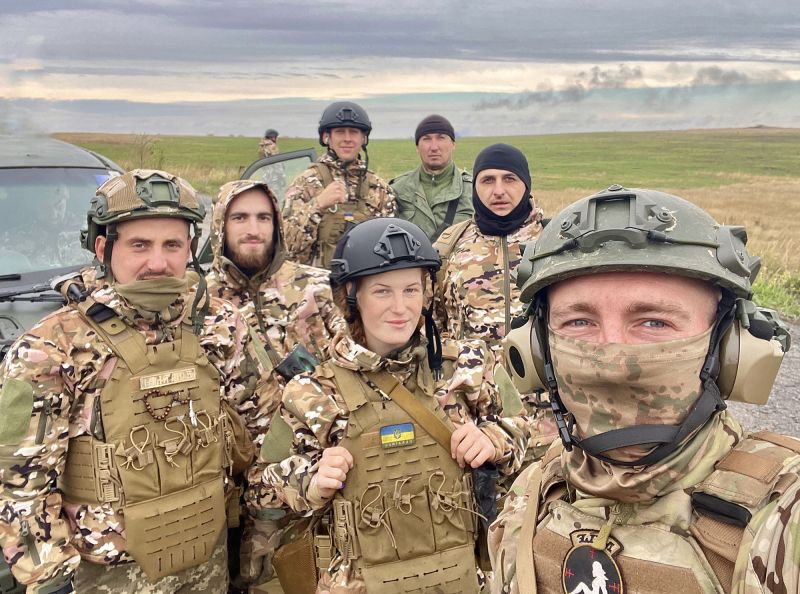
Heading platoons, repairing machines and doing twice as much: How the war has changed the lives of Ukrainian women
Most of the men in Oksana Rubanyak’s platoon are at least 10 years older than her. Before the war, having a young woman in charge of an all-male Ukrainian military unit might have given the troops pause. But as the platoon prepares for a frontline deployment at a time Ukraine is desperately trying to hold off Russian advances, things like gender and age no longer matter that much, Rubanyak said.
It’s a huge change compared to when she first joined the army two years ago.
The number of women in the military has increased significantly since Russia launched its full-scale invasion of Ukraine in February 2022, with more than 62,000 women currently serving in the Armed Forces of Ukraine, according to official statistics. More than 5,000 are serving in the combat zone, like Rubanyak, who is now 21.
Rubanyak was 19 when she joined the Ukrainian army as a volunteer. She served near Bakhmut and was, as now, the only woman in her platoon. She operated a heavy machine gun and, while she did everything the men did, she said she experienced some level of bias – such as some men trying to stop her from carrying heavy weapons.
“I heard people saying behind my back that I must be someone’s daughter, that my father would promote me and so on. It was something new for many people. Everyone was trying to find a catch, that just didn’t exist,” she said.
And while she said that there have been many positive changes in the past two years, there is still work to do. “Everything takes time,” she said. “Although all the conditions for women to serve in the army are there now, if they choose to.”
Working two jobs
As more and more Ukrainians join the war effort, the country’s women are increasingly stepping in – and not just in the military.
The Ukrainian government doesn’t disclose how many people have signed up to the armed forces in the last two years. However, it’s clear that hundreds of thousands have swapped their day jobs for military service.
With new waves of military conscription expected soon, employers are facing a new problem: how to fill the vacancies left by the men drafted. At the same time, hundreds of thousands of women have left the country, seeking refuge abroad.
According to the National Bank of Ukraine, employers nationwide are currently facing a shortage of about 60,000 skilled workers, an increase of some 20,000 since 2021.
With so many unfilled vacancies, women are often picking up the slack. A number of Ukrainian organizations and companies are offering training courses for women for some of the jobs conventionally thought of as male roles.
Halyna Shevchenko knows this firsthand. She works in a repair department of the Ukrainian Railways in the Poltava region. Before the war, she managed a team of 10 men who repaired complex parts of railway cars. When two of her colleagues were mobilized, the company couldn’t find anyone to fill their specialized positions.
So, Shevchenko started to learn the technical skills and now does some of the repairs herself. With women making up 40% of Ukrainian Railways’ employees, she is likely not the only one.
The new tasks – and the war – have significantly increased her workload.
The railways have carried more than 40 million passengers and huge amounts of cargo since the war began. The company has also introduced all sorts of new, military-focused services, including evacuation trains for wounded soldiers.
All of that means that Shevchenko’s team has to carry out more repairs.
“I am a techie, just like my colleagues. That’s why we communicate with the guys on an equal footing. We complement each other and consult on complex repairs,” she said.
War and the economy
Kernel, one of Ukraine’s largest agricultural producers and exporters, has also started to look for solutions to the worker shortages.
The company has also started training women to be boiler operators – a job women didn’t tend to do before the war.
“We piloted this project… to prove that women can work in conventionally male occupations. It was a successful experiment, and all the women continue to work,” she said.
Shevchenko said she is determined to keep doing the “man’s job” of fixing railway cars for as long as is needed. She has built up a good rapport with her team and said she feels respected by them.
“As long as I have enough health and strength, I will do everything to help my colleagues as much as possible – until the end, until we win,” she said.
